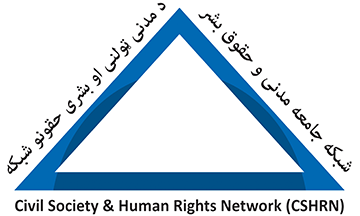and women rights organizations put forward issues related to peace talks if taken into account the peace process will lead to a more durable outcome. Else, there is a fear of falling into another chaos.
1. Justice:
• Injustice is the main problem in Afghanistan. Afghans want justice and their desire to achieve equality in the country is paramount. Justice (especially social justice) is an important prerequisite of sustainable, inclusive, and lasting peace. Peace without justice and justice without peace is frail. If the current democratic political system is an item of discussion, we expect the government negotiators not to compromise on justice, economic, social, and cultural rights.
• During the 40 years of war, millions of Afghans have fallen victim to oppression and injustice. An important contributing factor has been impunity. Experience from other parts of the world shows that the more just a peace process is, the more stable would be. Therefore, we call on the negotiating parties to pave the way for the implementation of transitional justice. The process may include steps from a trial of perpetrators of war crimes, crimes against humanity, genocide, and mass murder to repression and atonement or even simple apology. We also expect that any law or procedure that impede the implementation of transitional justice must be repealed.
2. Civil and political rights:
• In the event of a constitutional amendment, Chapter II of this law, which enshrines the fundamental rights and freedom of the Afghans, should be upheld.
• The negotiating parties must eliminate the grounds for extremism, especially religious extremism, and agree on a plan for a broader struggle against all forms of extremism.
• The principle of democratic system must be maintained and fundamental freedoms (freedom of expression, religion, press, assemblies, and protests) must be respected.
• Preserve the civil and political rights enshrined in the Constitution such as the protection against discrimination based on sex, ethnicity, religion, and disability; rights and freedoms such as the rights of the accused (right to a fair trial, the right to compensation, freedom of political association, freedom of assembly, right to self-defense and the right to vote) should also be preserved in the new political system that will be formed as a result of peace negotiations.
3. Economic social and cultural rights
• Peace negotiations, in addition to respecting all the principles of civil and political rights enshrined in the current constitution and the international treaties to which Afghanistan is a party, must insure fair access and provision. These rights include the right to work in fair and just conditions, the right to social protection, the highest attainable standard of physical and mental well-being, and the right to education. Citizens of Afghanistan must also be able to benefit from scientific advancement.
• So far, less has been done in Afghanistan to enhance opportunities for equitable political and socio-economic participation and inclusiveness. Lack of the right to work, access to health services, education, and other social services are among the most important shortcomings in this area that should be seriously considered in the negotiations.
• The rights of minorities and other vulnerable groups must be guaranteed. A mechanism for inclusion of marginalized ethnic, religious, and linguistic minorities, who make up a large proportion of war victims must be put in place.
• We call on the United Nations to appoint a special rapporteur on human rights in Afghanistan to report on violation of human rights on a regular basis.
4. Necessary and urgent actions:
• Unconditional ceasefire must be declared so that people can move freely and without fear.
• Schools should be opened so that students across the country can go to school and the security of education staff – male and female – should be ensured.
• Preserve all the achievements of recent years in the field of women’s rights and freedoms.
• Negotiators should allow the participation of representatives of civil society, victims, and marginalized ethnic, religious, and linguistic minorities. Additionally, during the peace negotiations, the right of access to information should be respected.
